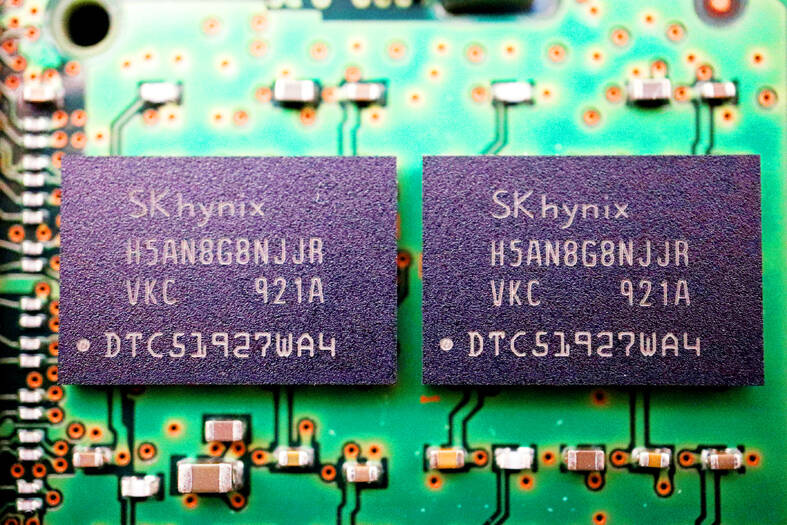South Korea’s semiconductor production last month fell by the highest rate since the global financial crisis, weighing on the nation’s industrial output and pointing to a further cooling of overseas demand for tech components as the world economy slows.
Chip production shrank for a fourth straight month, falling 15 percent from a year earlier in the largest drop since 2009, data released yesterday by Statistics Korea showed.
Overall industrial production contracted 3.7 percent from a year earlier for the biggest fall since the start of the COVID-19 pandemic, the data showed.

Photo: Reuters
The drop in activity speaks to weakening recovery momentum in a nation closely tied to the world economy. South Korea’s growth is already under pressure from falling exports and rising interest rates at home, with the gloomy outlook overseas adding to concerns.
The probability of recessions in major overseas economies such as the US is rising as the US Federal Reserve leads a wave of monetary tightening to combat inflation, and as Russia’s invasion of Ukraine continues.
Although China’s about-turn on its “zero COVID-19” policy suggests its economy might regain strength, a surge in infections would complicate the picture.
The weakening chip demand adds to an array of factors making South Korea’s economic outlook more uncertain, including the implications of a truckers’ strike that recently ended and a crowd-crush tragedy in Seoul, the South Korean Ministry of Economy and Finance said in a separate statement.
The cloudy outlook gives the Bank of Korea more reasons to be cautious as it mulls the end of its tightening cycle. The central bank has been hiking rates for more than a year, and is debating whether to carry out one or two more next year.
The latest output figures showed chip production was down 11 percent on a month-on-month basis, while semiconductor inventories climbed 20 percent from a year earlier last month, picking up from 12.9 percent the previous month, Statistics Korea said.
The double-digit increases in inventories since October underscores a global oversupply of memory chips, a sector in which South Korea leads production. Chipmakers are recalibrating their investment plans as they brace for a drop in demand for their products at home and abroad.

SELL-OFF: Investors expect tariff-driven volatility as the local boarse reopens today, while analysts say government support and solid fundamentals would steady sentiment Local investors are bracing for a sharp market downturn today as the nation’s financial markets resume trading following a two-day closure for national holidays before the weekend, with sentiment rattled by US President Donald Trump’s sweeping tariff announcement. Trump’s unveiling of new “reciprocal tariffs” on Wednesday triggered a sell-off in global markets, with the FTSE Taiwan Index Futures — a benchmark for Taiwanese equities traded in Singapore — tumbling 9.2 percent over the past two sessions. Meanwhile, the American depositary receipts (ADRs) of Taiwan Semiconductor Manufacturing Co (TSMC, 台積電), the most heavily weighted stock on the TAIEX, plunged 13.8 percent in

A wave of stop-loss selling and panic selling hit Taiwan's stock market at its opening today, with the weighted index plunging 2,086 points — a drop of more than 9.7 percent — marking the largest intraday point and percentage loss on record. The index bottomed out at 19,212.02, while futures were locked limit-down, with more than 1,000 stocks hitting their daily drop limit. Three heavyweight stocks — Taiwan Semiconductor Manufacturing Co (TSMC, 台積電), Hon Hai Precision Industry Co (Foxconn, 鴻海精密) and MediaTek (聯發科) — hit their limit-down prices as soon as the market opened, falling to NT$848 (US$25.54), NT$138.5 and NT$1,295 respectively. TSMC's

ASML Holding NV, the sole producer of the most advanced machines used in semiconductor manufacturing, said geopolitical tensions are harming innovation a day after US President Donald Trump levied massive tariffs that promise to disrupt trade flows across the entire world. “Our industry has been built basically on the ability of people to work together, to innovate together,” ASML chief executive officer Christophe Fouquet said in a recorded message at a Thursday industry event in the Netherlands. Export controls and increasing geopolitical tensions challenge that collaboration, he said, without specifically addressing the new US tariffs. Tech executives in the EU, which is

In a small town in Paraguay, a showdown is brewing between traditional producers of yerba mate, a bitter herbal tea popular across South America, and miners of a shinier treasure: gold. A rush for the precious metal is pitting mate growers and indigenous groups against the expanding operations of small-scale miners who, until recently, were their neighbors, not nemeses. “They [the miners] have destroyed everything... The canals, springs, swamps,” said Vidal Britez, president of the Yerba Mate Producers’ Association of the town of Paso Yobai, about 210km east of capital Asuncion. “You can see the pollution from the dead fish.